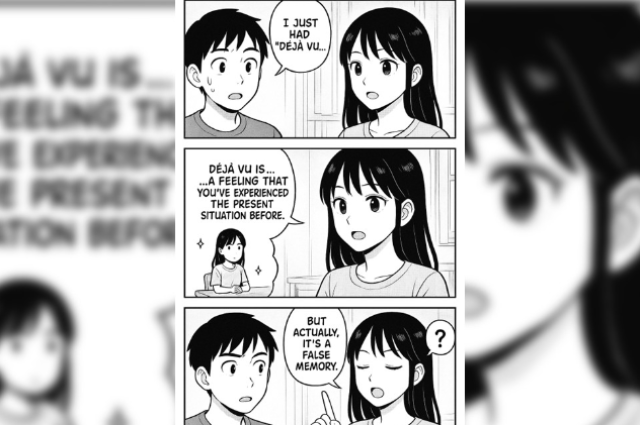
Déjà vu-the strange feeling
Have you ever been in the middle of a conversation, or walking into a room and suddenly felt like “Hey! This has happened before!”. You stop and look around, and think “wait a minute…this all has happened to me!” but you know that is impossible. That weird and mysterious feeling ia called as déjà vu (say it like day-zha voo), a French word that means already.
Most people experience déjà vu once in their lives, but there are multiple reports of déjà vu. In short, it is a moment when the present feels like the past, and nobody knows why it happens. Over time scientists, physiologists, and researchers have tried to understand it-yet we don't know much about déjà vu, but we are getting close to solving the mysterious puzzle of the mind.
What is déjà vu
Déjà vu is an intense feeling that a new experience is strangely familiar. It usually lasts only a few seconds and can happen during the most ordinary activities—talking with friends, sitting in a classroom, walking through a park, or watching a movie. The main part of déjà vu is that the person knows the situation is new, but it feels like they’ve experienced it before.
Some people feel slightly scared or confused during déjà vu, while others may just be amazed. Either way, it’s not something you can control—and it’s very hard to study in a lab since it happens without warning.
Different types of déjà vu
While the original type of déjà vu is well-known, there are several experiences confused with it:
- Déjà vécu – "already lived": The feeling that a current situation has been lived through in every detail before, including thoughts and feelings — like your brain is standing there with a clipboard, nodding and saying, "Yep, we’ve done this. Move along, people!"
- Déjà senti – "already felt": A feeling that a thought or emotion has been felt before, even if the surrounding environment doesn’t seem familiar — like your brain’s getting emotional déjà vu and saying, "I don’t know where we are, but my feelings sure have been here partying before!"
- Jamais vu – "never seen": The opposite of déjà vu. It's when something very familiar suddenly feels strange and unfamiliar, like seeing a word and thinking it’s spelled wrong even when it’s right — your brain glitching out and screaming, "I’ve never seen this weird thing in my life!" even though you see it every day.
Who experiences déjà vu
Déjà vu is incredibly common. Many people report experiencing déjà vu once in their lives. It occurs mostly in:
Young people, mostly between the ages of 15 to 25.
People who travel and are close to the environment.
Creative thinkers and imaginative people
People who are tired and stressed out.
What causes déjà vu
Déjà vu is that weird feeling when you’re sure you’ve lived a moment before — but you probably haven’t. Scientists say there’s no one single reason why it happens, but there are lots of interesting (and pretty funny) ideas:
- Memory mix-ups: Sometimes your brain acts like that one clumsy friend who trips over nothing. It mixes up memories and thinks something brand new is something old. Oops!
- Brain glitches: Your brain is like a giant computer... but even computers freeze sometimes! A little glitch in your brain can scramble up your memories, making new things seem strangely familiar like you’re stuck in a rerun of your own life.
- Slow signals: Imagine your brain is getting a message from two different messengers. One runs fast, and the other stops for coffee. When the slowpoke finally delivers the same info, your brain’s like, “Hey, didn’t I already hear this?” — and boom, déjà vu.
- Other causes: Being super tired, super stressed, or even taking certain medicines can confuse your brain too. When your brain is feeling dramatic, it might just hit you with a surprise déjà vu moment.
So next time you feel like you’re stuck in a real-life time loop, don’t worry — it’s probably just your brain being its silly, glitchy self!
Is déjà vu dangerous?
For most people, déjà vu is completely harmless. It is just a different way of how the brain works. It doesn't mean anything is wrong (even though it might feel that way).
However, if someone experiences déjà vu very often - especially with confusion, memory loss, or physical symptoms - it can cause neurological issues, and it is best to show the doctor.
Déjà vu in movies and physiology
Déjà vu has captured people’s imaginations for centuries. Writers, filmmakers, and philosophers have used it as a symbol of mystery, fate, time loops, or alternate realities. It’s been featured in movies like The Matrix, where déjà vu signals a glitch in the system. Some people even believe that déjà vu is a sight of a parallel universe or past life, though there is no scientific evidence of the idea.
Conclusion: A Small Look into How Our Mind Works
Déjà vu is one of the weirdest and most puzzling things we ever experience. It's that strange feeling when you’re sure you’ve lived through a moment before — like your life is secretly a rerun and no one told you. Even with all the fancy brain science we have today, déjà vu reminds us that there’s still a huge pile of things we don’t understand about how the mind, memory, and reality are all tangled up together. It’s like our brain sometimes clicks the "repeat" button for no good reason — and we just have to stand there feeling confused, pretending we’re not glitching like a broken robot.
